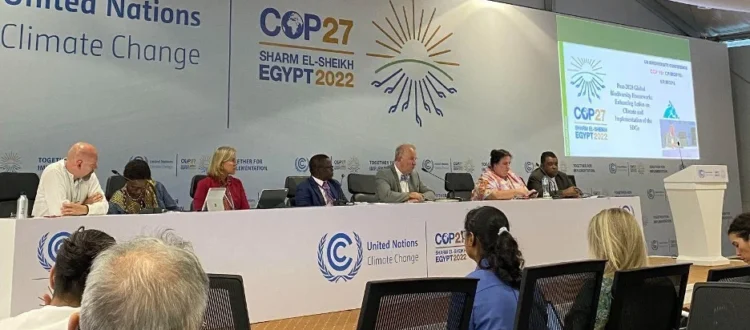BIODIVERSITY FROM COP27 TO COP15
A side event was held at COP27 Thursday, 17 November on the Global Biodiversity Accord which is slated for approval at the next UN Conference on Biodiversity kicking off on 7 December in Montreal.
Speakers included Elizabeth Mrema, Executive Secretary of the UN Convention on Biodiversity (CBD), the two Global Biodiversity Accord Working Group co-chairs (Basile van Havre and Francis Ogwal) and representatives of the UNFCCC, the UN Convention to Combat Desertification (UNCCD), UNEP and FAO.
Elizabeth Mrema, Executive Secretary of the UN Convention on Biological Diversity (CBD), reiterated the importance of having dedicated a day at COP27 (Thursday, 16 November) on biodiversity. She recalled that nature was first brought to the negotiating table really in Glasgow, but it was here in Sharm El Sheik that biodiversity truly became part of the agenda.
The challenges created by the climate and the biodiversity crisis are similar and won’t be solved using a siloed approach. Various analyses tell us that 30% of emission mitigation should come from nature, itself. Thus, we’ll not be able to meet the Paris target of keeping global temperatures below 1.5C without protecting biodiversity and natural ecosystems. It’s thus no coincidence that some of the main discussions on climate change mitigation focus on Nature- Based Solutions (e.g. actions to address societal challenges like climate change by protecting, sustainably managing and regenerating ecosystems). It’s also no coincidence that COP27 on climate and COP15 on biodiversity are taking place back to back and only a few weeks apart. Rather, it’s a signal reminding us of how vital it is to address these two crises in tandem.
However, during the heads-of-delegation discussions that took place on Friday afternoon, both the European Union and Colombia expressed immense disappointment that COP15 and the CBD were not noted in the cover or final decision drafts in Sharm el-Sheikh.
During the meeting, Mrema also underscored that it will be crucial to reach an ambitious and transformative Global Agreement at the Montreal conference to protect biodiversity. However, she warned that clear implementation plans will also be in order. Implementation is critically important given only 6 of the 20 Aichi targets (the biodiversity targets set for 2011-2020) have been even partly met and none fully reached.
There’re two main reasons for this failure according to Mrema. The first lies in the lack of economic funding supporting biodiversity. Among the last decade’s targets was a call for doubling international economic flows to protect biodiversity (to the amount of US$120 billion). Funds have been allocated, but the target itself was insufficient for achieving the Aichi goals. Therefore, one of the most crucial and debated points at COP15 will be that on financial resources for protecting biodiversity. Montreal will need to resolve disagreements on how to align national and international public and private financial flows. Ambitious decisions will need to be made on the numerical targets for these economic commitments. Biodiversity finance is needed as well to support implementation of the targets decided upon in Montreal, Mrema warned.
Secondly, it’s vital to improve planning, reporting and review mechanisms. We failed to implement the Aichi targets over the last decade because countries lagged in developing a monitoring, reporting and review system. This failure to meet the Aichi Targets is concerning. We can’t allow it to happen with the new ones in the Agreement for this decade which is currently under discussion.
In this regard, CBD co-facilitators Basile van Havre and Francis Ogwal reiterated that a robust planning, reporting and review system is one of the critical aspects of the Global Agreement to be negotiated at COP15. This mechanism is crucial for monitoring implementation. We need ambitious targets, financial resources and a robust review and monitoring system. And we need all these things at once, the co-facilitators recalled. In fact, in the Agreement under negotiation at COP15, monitoring is included in the text. This is because the monitoring system during the previous decade was developed very late or some years after the 2010-2020 Agreement had been approved.
We need to endorse an ambitious and transformative global agreement at COP15, Mrema concluded. She also warned, however, that an agreement is just a piece of paper and means nothing without the supporting economic resources or implementation and monitoring mechanisms that go with it.
Article by Margherita Barbieri, Climate and Advocacy volunteer

